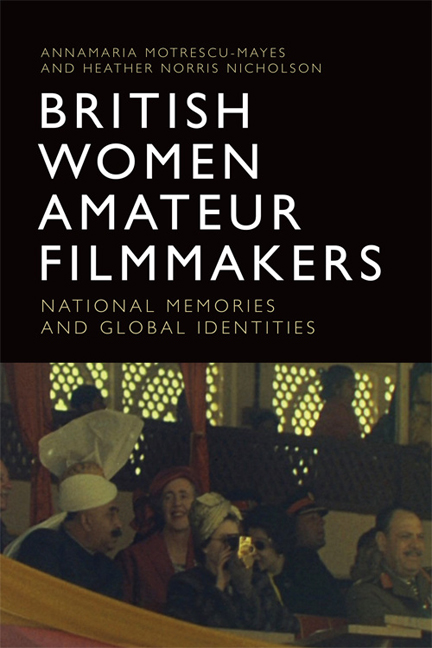Book contents
- Frontmatter
- Contents
- List of Figures
- List of Sources and Abbreviations
- Acknowledgements
- Foreword
- 1 Amateur Women Filmmakers as Producers of Cultural Meaning
- 2 Webs of Production and Practice
- 3 Resisting Colonial Gendering while Domesticating the Empire
- 4 Cameras Not Handbags: The Essential Accessory
- 5 Through Women's Lens: Imperial and Postcolonial Class and Gender Hierarchies
- 6 Teacher Filmmakers
- 7 British Women's Media Narratives of Gender and Collective Memory
- 8 Reimagining Boundaries: Amateur Animations
- Afterword
- Selected Bibliography
- Index
6 - Teacher Filmmakers
Published online by Cambridge University Press: 12 November 2019
- Frontmatter
- Contents
- List of Figures
- List of Sources and Abbreviations
- Acknowledgements
- Foreword
- 1 Amateur Women Filmmakers as Producers of Cultural Meaning
- 2 Webs of Production and Practice
- 3 Resisting Colonial Gendering while Domesticating the Empire
- 4 Cameras Not Handbags: The Essential Accessory
- 5 Through Women's Lens: Imperial and Postcolonial Class and Gender Hierarchies
- 6 Teacher Filmmakers
- 7 British Women's Media Narratives of Gender and Collective Memory
- 8 Reimagining Boundaries: Amateur Animations
- Afterword
- Selected Bibliography
- Index
Summary
Thirty-one children; Thirty-one chances. Thirty-one futures, our futures … Everything they become, I also become. And everything about me they helped to create. (Codell 2001)
Esmé Raji Codell (2001: 194) writing about her first year of teaching in a Chicago elementary school in 2001, captured her acute sense of how personal and professional subjectivities intersect. This close connection is not unique to newly qualified teachers; for many teachers it is part of classroom relationships that combine authority, agency and emotion as aptly summarised by Deborah Britzman's words, ‘We are affected by the worlds we affect’ (2006: xi). Such reminders sensitise us to the expectations, experience and awareness embedded within cine films made by teachers in the past. Not only did those professionals have to negotiate their own roles with their pupils and colleagues: the opinions of parents and other people, social attitudes and past stereotypes all contribute to teacher identity. From the early and middle part of the last century, whether college trained or advancing from pupilteacher status in their own local school, being a paid woman professional challenged gender norms and expectations. For the women in this chapter – and referred to elsewhere – filmmaking was part of how they navigated their sense of selfhood in settings where the contradictions of tradition and modernity coexisted.
Throughout the history of amateur cinema, some women filmmakers have been teachers. They made films during school holidays, encouraged others to make and enjoy films, and filmed where they worked. Public fears and policy shifts on child protection have greatly reduced informal filming in schools even for parents, but for much of the last century, teachers had unrestricted access to recording their pupils. Outside academia, such scenes of past school life have popular appeal as unproblematic visual connectives to aspects of childhood and growing up. Public appetite for such materials’ immediacy and connections to past memories often pays scant attention to the person in charge of the camera. Shifting attention to the filmmakers, however, discloses interests in recording in and away from the classroom that, for some women, became key features of their own visual practice, reputation and identity. This chapter explores how some women teachers responded to the visual opportunities offered by moving imagery and produced films sometimes discussed too narrowly as nostalgic reverie (Chalfren, 1987: 75; Ishizuka and Zimmermann 2008; Niemeyer 2014).
- Type
- Chapter
- Information
- British Women Amateur FilmmakersNational Memories and Global Identities, pp. 133 - 162Publisher: Edinburgh University PressPrint publication year: 2018



